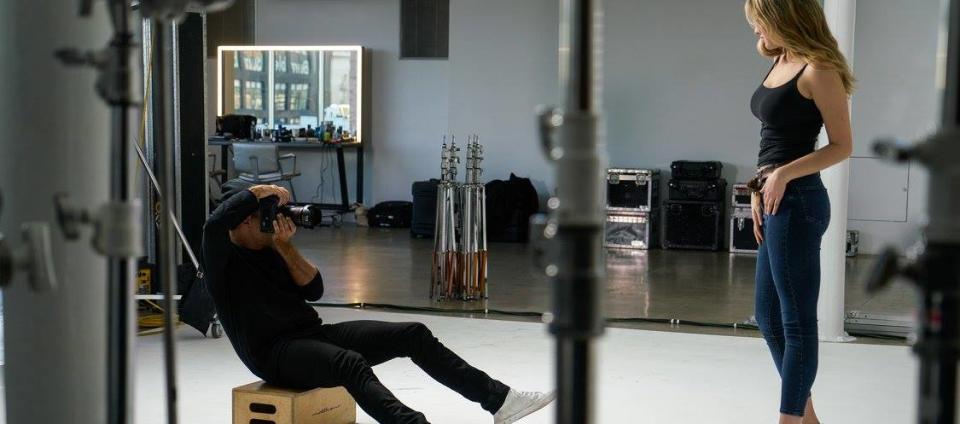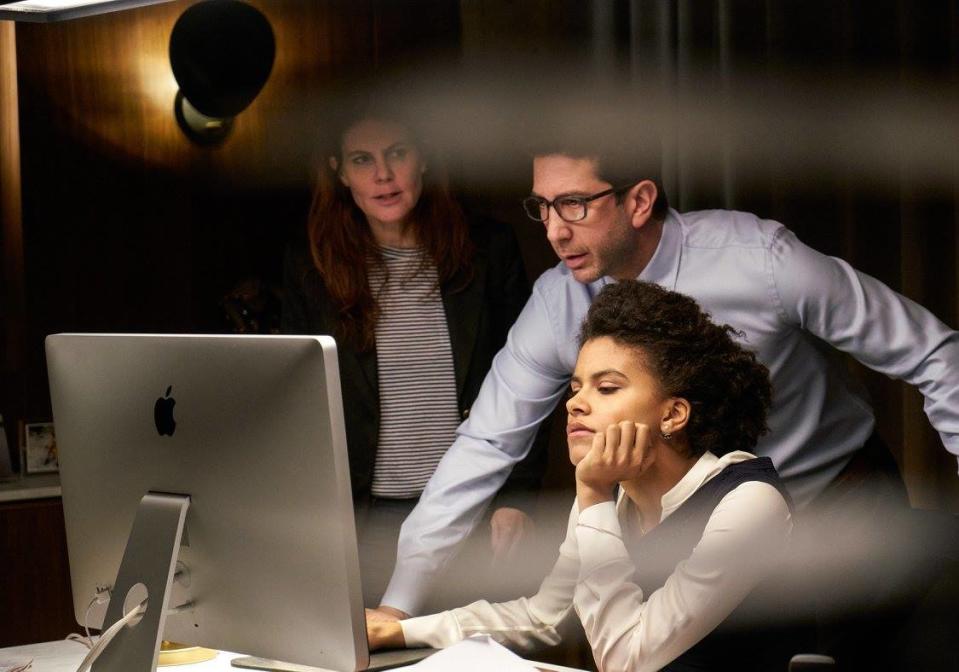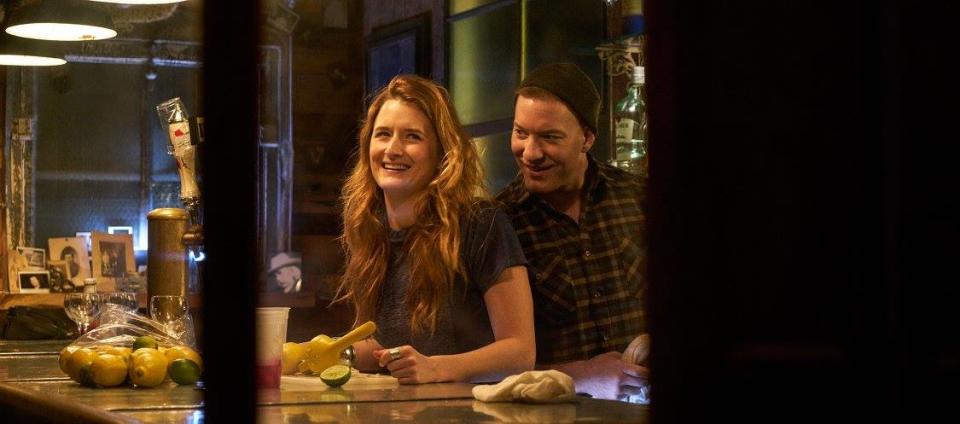David Schwimmer hopes to educate men with his short films about sexual harassment
“You’ve got a beautiful body,” a male photographer says while snapping photographs of a female model. “Dance baby. Touch yourself … slide your hand down your pants.” The model looks visibly uncomfortable, but she complies. The photographer is clearly in charge; the photographer is clearly the one with the power. As the audience, all we see is him and her. Him: sitting on the floor snapping photographs, calling out orders; her: standing in front of him, clearly ill at ease but doing what he says. As she touches herself, the photographer instructs her, “I want to see the pleasure on your face … I have a hard-on right now, can you see it?”

As the shot pans out we see that the room doesn’t contain solely the photographer and the model; instead it is a room filled with people watching the photo shoot, people who we have to assume are executives and assistants, makeup artists and lighting designers. They all watch, still, expressionless. After a few more seemingly eternal seconds filled with the snap of the camera and the photographer’s lewd comments, he finally announces “I’ve got it.” The mass of people behind him begin mingling, seemingly satisfied; the photographer gets up and heads toward the crowd, and the model stands alone and uncomfortable. The words “#ThatsHarassment” appear on the screen.
This video, titled The Photographer, and starring Bobby Cannavale as the photographer and Anna Van Patten as the model, is one of six short videos created by actor David Schwimmer (in the role of executive producer) and Sigal Avin (as screenwriter and director) in partnership with the Ad Council to spread the message of what exactly sexual harassment looks like and how to stop it. The point of the series is to remove the ambiguity about what counts as harassment by visually showing unacceptable behavior. The other goal of the videos is to provide support for victims, advice for employers about how to prevent sexual harassment in their workplace, and awareness for everyone.

“I want [viewers] to realize and even have a sigh of relief that they can call that weird feeling that they had harassment and understand that it’s wrong,” Avin tells Yahoo Lifestyle about how she wants these videos to be seen. “Because sometimes it’s so subtle, and it’s something you can brush off. But I hope that in seeing it we can see that it’s not OK, and then get empowered and take action.”
“For men watching,” Schwimmer adds, “I think the purpose is to educate, illuminate.”

Avin first made a similar series of videos about harassment in Israel in 2016. They quickly got a lot of traction there, and she decided to remake the series for the United States. “That’s when I called David,” Avid said on AOL Build. “He’s the first person I thought about when I tried to think who can make these happen in the States. I sent him the films and David immediately said, ‘I have to do this here.'”
As of past Friday, 30-second versions of the videos live on Hulu, Amazon, Showtime, Fox, and CBS. By Monday, they were also airing in New York City taxi cabs. “I wanted to figure out what sexual harassment was,” Avin said on AOL Build. “Because we were just reading about it, and hearing about it, but you never got to see it.”
The videos — which star a host of famous faces including Cynthia Nixon, Emmy Rossum, and Schwimmer himself — show six different scenarios (five of them in the workplace, one of them in a doctor’s office) depicting what could be considered harassment gray areas. They were originally released in April, but after the Harvey Weinstein scandal, Schwimmer decided they should be rereleased. “It was almost as if they were before their time,” Avid said about their initial release. “People were kind of afraid.”
In addition to the videos themselves, Schwimmer and Avin have also partnered with the National Women’s Law Center to make a digital toolkit that will help employers address and hopefully prevent harassment in the workplace.
“We wanted to rerelease them, along with a call to action, to bring more exposure to them. We wanted to get the help hotline out there, RAINN’s hotline, to victims and bystanders, and to get this digital toolkit out there,” Schwimmer says. “Our goal was to rerelease the films and PSAs but to make it a call to action. We wanted to provide solutions.”
The videos are certainly making an impact. Aside from their prominence on screens all over, both Avin and Schwimmer note personal interactions in which people close to them have learned something from the shorts. “A lot of men said to me, ‘Thank you for the opportunity to see the situation from the outside,'” Avin said. By watching, “they can go through and see where they maybe crossed a line.”
Schwimmer mentioned one of the actors from the #ThatsHarassment videos, someone he says he’s known for 20 years and can unequivocally say is a good guy. That actor came up to Schwimmer while filming their video with a revelation of his own. Schwimmer said their harassment videos caused that man to reflect on how occasionally he hugs female crew members on sets to express a job well done. “She may not have the power to say no,” Schwimmer recalls his friend saying. “I’m not really giving her a choice. She kind of has to hug me back because I’m an actor on that show and therefore by definition I’m above the line and she’s below the line as a crew member.” Schwimmer also recounted that actor’s resolution, “he said, ‘You know what — I’m gonna stop doing that.’ So that was really interesting because he suddenly was becoming more evolved and aware.”
Moving forward, both Schwimmer and Avin plan to make a video series for younger people — as young as elementary school — to learn more about sexual harassment. “We’re both very interested in that area,” Schwimmer says. “We might do another series aimed at younger people.” With a look of determination, Avin adds, “Hopefully.”
For support or information about sexual harassment, call 800-656-HOPE or visit RAINN.org/ThatsHarassment
Read more from Yahoo Lifestyle:
New York will be the first state to require mental health education in schools
‘I grew up in a war zone’: Black Lives Matter’s Patrisse Khan-Cullors on racism in America
Follow us on Instagram, Facebook, and Twitter for nonstop inspiration delivered fresh to your feed, every day.

